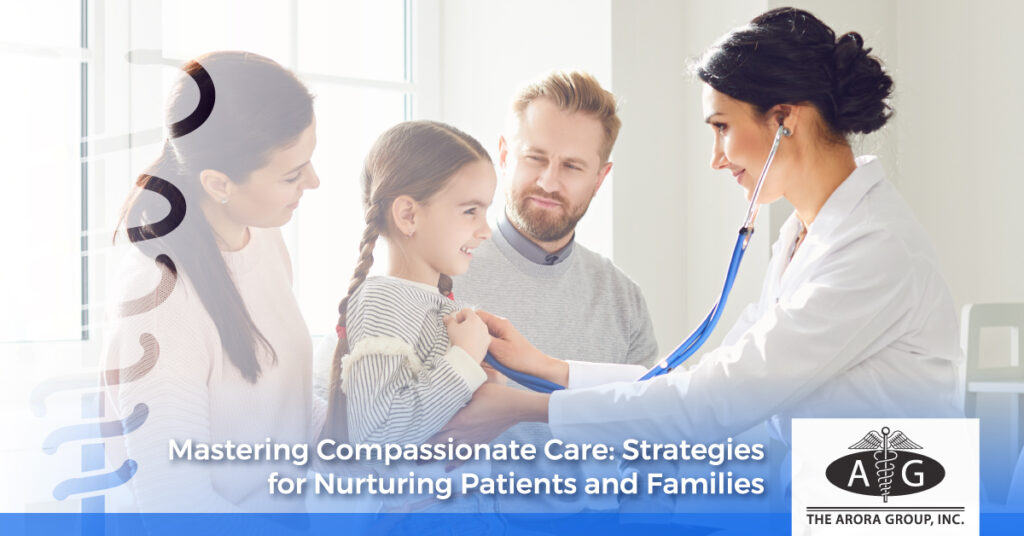Compassionate care lies at the heart of healthcare, embodying the deep connection between healthcare professionals and their patients. It transcends medical treatment, recognizing that true healing involves addressing not only the physical ailments but also the emotional, psychological, and spiritual well-being of patients and their families. In this article, we will explore the essence of compassionate care and delve into invaluable strategies that empower healthcare professionals to create a nurturing environment for their patients and their loved ones. By embracing empathy, active listening, and effective communication, healthcare providers can enhance healing and foster a holistic approach to patient-centered care.
How to Master Compassionate Care
The Power of Empathy in Healthcare
Empathy is the cornerstone of compassionate care. It is the ability to understand and share the feelings of others, allowing healthcare professionals to connect with their patients on a deeper level. When healthcare providers demonstrate empathy, they create a safe and supportive environment that promotes trust, emotional well-being, and patient satisfaction.
To cultivate empathy, healthcare professionals can start by actively listening to their patients and demonstrating genuine interest in their concerns. By taking the time to understand their fears, worries, and hopes, healthcare providers can provide personalized care that addresses their patients’ physical symptoms and emotional and psychological needs.
Additionally, empathy involves recognizing the unique experiences and backgrounds of patients and their families. Understanding cultural, religious, and personal beliefs allows healthcare providers to tailor their approach and provide sensitive, respectful, patient-centered care.
Enhancing Patient-Centered Care
Active listening is a powerful tool that empowers healthcare professionals to provide patient-centered care. By attentively listening to their patients, healthcare providers can gather valuable information, build rapport, and foster a strong therapeutic alliance.
Active listening involves more than just hearing; it requires giving undivided attention to the patient, maintaining eye contact, and displaying non-verbal cues that convey understanding and empathy. It also involves asking open-ended questions and encouraging patients to share their thoughts, concerns, and expectations.
When healthcare professionals engage in active listening, they gain deeper insights into their patient’s needs, enabling them to develop individualized care plans and make informed decisions. This collaborative approach improves patient outcomes, enhances patient satisfaction, and fosters a sense of empowerment and autonomy.
Bridging Gaps and Fostering Trust
Effective communication is essential for building trust, establishing clear expectations, and ensuring patients and their families feel heard and valued. It involves using simple and jargon-free language, adapting communication styles to meet patients’ individual needs, and providing information compassionately and understandably.
Healthcare professionals can enhance communication by practicing active and reflective listening, clarifying information, and addressing patient concerns or questions. In addition, involving family members in the communication process can strengthen support systems and improve the overall experience for patients and their loved ones.
Clear and effective communication also extends beyond verbal interactions. Non-verbal cues, such as body language and facial expressions, are vital in conveying empathy and building rapport. By being mindful of these non-verbal signals, healthcare providers can ensure that their messages align with their intentions and create a positive and supportive environment.
Nurturing Patients and Families Beyond Medical Treatment
Compassionate care goes beyond addressing physical ailments; it encompasses a holistic approach that recognizes the interconnectedness of the mind, body, and spirit. Healthcare professionals can embrace this approach by incorporating supportive therapies, such as mindfulness techniques, music therapy, and art therapy, into the care plan. These complementary therapies can provide emotional support, reduce anxiety and stress, and foster a sense of well-being for patients and their families.
Moreover, holistic care involves empowering patients and their families to actively participate in their healthcare journey. By providing education, resources, and support, healthcare professionals enable patients to make informed decisions, take ownership of their health, and promote their overall well-being.
Take Your Nursing Skills to the Next Level
At The Arora Group, we recognize the transformative power of compassionate care. Our mission is to provide healthcare professionals with opportunities to serve a higher purpose by caring for American heroes, their families, and veterans. Joining our team opens doors to nursing government contract jobs that allow you to make a real difference. We work closely with our nurses, understanding their interests, dreams, and career goals, to match them with opportunities that align with their passion for compassionate care. Together, let us champion the holistic well-being of patients and their loved ones and bring about a paradigm shift in healthcare that celebrates empathy, active listening, and effective communication. Visit our website or contact us today to learn more about how you can join us in this mission.
